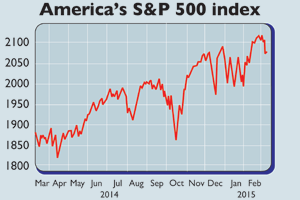Investors in US stocks get withdrawal jitters
The US Federal Reserve is running out of reasons not to raise interest rates.

Get the latest financial news, insights and expert analysis from our award-winning MoneyWeek team, to help you understand what really matters when it comes to your finances.
You are now subscribed
Your newsletter sign-up was successful
Want to add more newsletters?

Twice daily
MoneyWeek
Get the latest financial news, insights and expert analysis from our award-winning MoneyWeek team, to help you understand what really matters when it comes to your finances.

Four times a week
Look After My Bills
Sign up to our free money-saving newsletter, filled with the latest news and expert advice to help you find the best tips and deals for managing your bills. Start saving today!
Good news, it seems, is bad news for equities. In February US payrolls again beat expectations, expanding by 295,000. The unemployment rate declined to 5.5%, the lowest level in almost seven years. US stocks promptly swooned, posting their worst day in two months.
The problem for markets is that a stronger economy implies higher interest rates in America, which would restrict the liquidity that has been sloshing into stocks at an unprecedented rate over the past few years. US rates have been at practically zero since the crisis and they're not alone.
More than 80% of global market capitalisation is supported by zero-interest-rate policies, says Michael Hartnett of Bank of America Merrill Lynch. This almost-free money has leaked into asset markets and papered over the lacklustre fundamentals. Investors both in the US and elsewhere have got so used to it, they are having withdrawal jitters before the drugs are even taken away.
MoneyWeek
Subscribe to MoneyWeek today and get your first six magazine issues absolutely FREE

Sign up to Money Morning
Don't miss the latest investment and personal finances news, market analysis, plus money-saving tips with our free twice-daily newsletter
Don't miss the latest investment and personal finances news, market analysis, plus money-saving tips with our free twice-daily newsletter
But it looks as though US investors will soon have to go cold turkey. The US Federal Reserve "is gradually running out of reasons not to raise rates" from emergency levels, as David Fuller puts it on fullertreacymoney.com.
While inflation has been subdued, there are signs that wage growth will soon improve more strongly. Wages are climbing at an annual rate of 2%, and they tend to be a lagging indicator. So if the Fed waits for them to rise faster, it could end up letting inflationget out of control. The markets are pencilling in a first rate hike in June.

However, these are uncharted waters. Equities have never enjoyed this much liquidity for so long, and debt levels in advanced economies are far higher than before the last rate cycle.
Earnings are a further headwind.The stronger dollar and lower oil prices have already undermined profits; now the improving job market will increase pressure on wages. S&P 500 earnings now look set to decline for two successive quarters, which hasn't happened since the crisis.
Meanwhile, valuations haven't factored in potential disappointments.The S&P's cyclically adjusted price/earnings ratio is 27 higher than it has been over 90% of the time since 1928.
Get the latest financial news, insights and expert analysis from our award-winning MoneyWeek team, to help you understand what really matters when it comes to your finances.

-
 Reach for the stars to boost Britain's space industry
Reach for the stars to boost Britain's space industryopinion We can’t afford to neglect Britain's space industry. Unfortunately, the government is taking completely the wrong approach, says Matthew Lynn
-
 Properties for sale with beautiful kitchens
Properties for sale with beautiful kitchensThe best properties for sale with beautiful kitchens – from a Modernist house moments from the River Thames in Chiswick, to a 19th-century Italian house in Florence